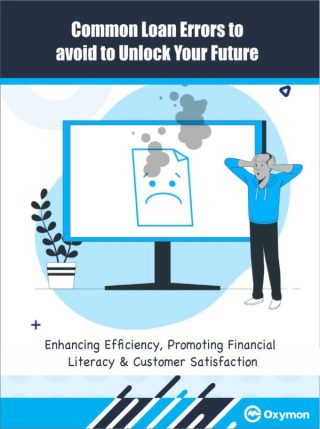Loan Errors to Avoid to Unlock Your Future
Loan applications historically have proven to be stressful in most cases, especially due to basic errors made by both lenders and applicants. When applying for loans, it’s important to avoid certain mistakes that could potentially impact your chances of approval or lead to unfavourable terms. Below are some common loan errors to avoid:
- Inaccurate or incomplete information: Ensure that all the information you provide on your loan application is accurate and up to date. Double-check your personal details, employment information, and financial statements before submitting your application.
- Applying for multiple loans simultaneously: Applying for multiple loans within a short period can raise red flags for lenders. Each application typically results in a hard inquiry on your credit report, which can temporarily lower your credit score. Instead, research and choose the loan that best suits your needs before applying.
- Failing to shop around: Don’t settle for the first loan offer you receive. Different lenders may offer varying interest rates, fees, and terms. Shop around, compare loan offers, and negotiate to secure the most favourable terms possible.
- Overlooking the fine print: Carefully read the terms and conditions of the loan agreement before signing. Understand the interest rate, repayment schedule, fees, penalties, and any other relevant details. Pay close attention to prepayment penalties or clauses that may impose extra charges if you repay the loan early.
- Borrowing more than you can afford: Calculate your repayment capacity and only borrow an amount that fits your budget. Taking on more debt than you can handle can lead to financial stress and potentially defaulting on your loan.
- Missing payments or defaulting: Ensure you make timely payments on your loan. Missing payments or defaulting can severely damage your credit score and make it challenging to secure loans in the future. Set reminders or automate payments to stay on track.
- Providing inadequate documentation: Different loans require specific documentation to support your application, such as proof of income, tax returns, bank statements, or collateral information. Failing to provide the necessary documents can delay the loan approval process or lead to rejection.
- Not considering alternative options: Explore alternative loan options, such as credit unions or peer-to-peer lending platforms, which may offer competitive rates and terms. Research different types of loans to determine which one best suits your needs.
- Not seeking professional advice: If you’re unsure about any aspect of the loan application process, consider seeking advice from a financial advisor or loan officer. They can provide guidance based on your specific circumstances and help you make informed decisions.
Avoiding these basic errors could be the difference in getting approved or rejected on your loan application. By steering clear of these mistakes, you increase your chances of securing favourable loan terms and a successful application suitable for your needs.






